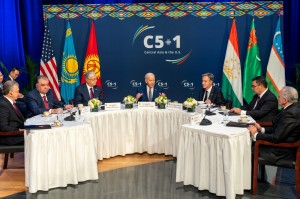 The US is eager to establish a new Central Asia policy after years of neglect. Realizing that it has neglected Central Asia, partly because of the attention devoted to halting Russia’s all-out war on Ukraine, and aware that China is intensifying its economic influence, the US is aiming to reset its policy towards the region.
The US is eager to establish a new Central Asia policy after years of neglect. Realizing that it has neglected Central Asia, partly because of the attention devoted to halting Russia’s all-out war on Ukraine, and aware that China is intensifying its economic influence, the US is aiming to reset its policy towards the region.
President Joe Biden met heads of regional states on the sidelines of the United Nations General Assembly in New York in September. The leaders discussed a new roadmap for relations under the so-called C5+1 format (of the US plus Kazakhstan, the Kyrgyz Republic, Tajikistan, Turkmenistan, and Uzbekistan.)
Biden described the meeting as historic. “The US has shared commitment to sovereignty, independence, territorial integrity. These principles matter more than ever, in my view. I genuinely believe the world is safer when we stand together,” he said, calling for further development of relations. During the meeting, regional security, economic cooperation, green development, climate change, sustainable development, and the Trans-Caspian Trade Route were discussed.
Furthermore, the participants decided to establish a group called C5+1 Critical Minerals Dialogue to “develop Central Asia’s vast mineral wealth and advance critical minerals security.” Issues related to energy security and valuable resources will be addressed through this group.
The C5+1 format aims to do important work in the region through the USAID Power Central Asia program, committing to work towards national market liberalization reform, clean energy, and regional market power goals. The program has a budget of $39m. In the period to 2025, it aims to eliminate greenhouse gas emissions in Kazakhstan, create a national energy regulator and new electricity market in Uzbekistan, reduce methane emissions from the oil and gas sector in Turkmenistan, create a clean energy transition in Kyrgyzstan, and promote competitive procurement of renewable energy in Tajikistan.
The US also hopes the group will channel aid to support Afghanistan and the Central Asian republics. It was reported that the US administration is ready to provide the necessary assistance to prevent radicalization and ensure border security in the region. This may well form part of a post-withdrawal US policy for Afghanistan to replace its security-centered approaches.
The US initiative comes after Russia’s Russia-Central Asia Summit in 2022 and China’s China-Central Asia Summit in 2023. Against Russia and China, which have always had an advantage in Central Asia due to their regional proximity, the US’s belated initiative nevertheless offers opportunities.
Despite two milestones — the fall of the Soviet Union and 9/11 — US-Central Asia relations have never reached the desired level. The US administration’s security-oriented policies, which prioritized Afghanistan in the region, failed to bring about the Western-backed economic and social transformations and infrastructure improvements that the Central Asian republics expected. In contrast, relatively long-term regional organizations such as the Commonwealth of Independent States, the Shanghai Cooperation Organization, the Eurasian Economic Union, and the Collective Security Treaty Organization, influenced by Russia and China, have made some progress.
The US clearly seeks to decrease the influence of Russia and China. But it needs to come up with more realistic and credible policies. For example, what can it offer to challenge Russia’s $40bn trade volume with the countries in the region, and China’s $70bn trade volume? At what level will talks be held with these countries? Many such questions remain to be answered.
In the last meeting, the US focused mainly on secondary issues and refrained from making proposals such as mega-projects presented by China. From the US side, there is a desire to start a new process by shaping the format of the dialogue, and establishing sub-meeting groups and discussion topics.
However, sustained presidential-level talks with the group are essential to increase US influence, since this is the way this region does politics. Russia, China, Turkey, and even South Korea have succeeded so far with this format. We will see how the US approaches this in the coming years.
Dr. Mehmet Fatih Oztarsu – CEPA: link

 Kasım 2nd, 2023
Kasım 2nd, 2023  oztarsu
oztarsu  Posted in
Posted in  Tags:
Tags: